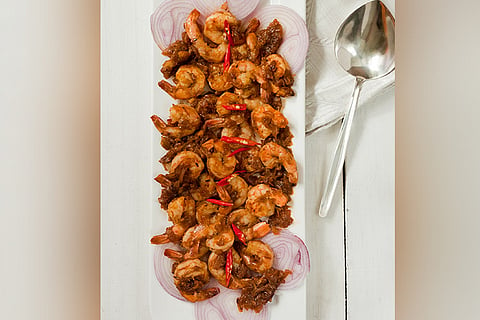

It’s not uncommon to hear, especially in decades past, of a cookbook being packed into a son or daughter’s suitcase as they left their families for the first time. It was a way to carry a piece of home with you — the people around you may not look the same as you or even speak the same language, but at least you had a reliable guide to help you make pandi curry for dinner.
“Many children of my generation were not taught to cook a decent meal and suddenly realised the need for some basic skills on the occasion of marriage, or at the time of moving away from home,” said 68-year-old food writer Jyotsna Shahane.
At that time, finding cookbooks that catered to regional tastes wasn’t an easy task. While some relied on letters from home, with handwritten recipes scribbled on bits of paper, others carried cookbooks that attempted the impossible task of covering the entirety of India’s vast and varied cuisine. “Books, while useful, could not possibly be said to cover any regional cuisine with any depth of knowledge,” she added.
But for many in the Konkani community, and its diaspora across the world, there was Narayani Nayak’s Cookery Craft.
Sixty-eight years after that book’s publication in 1952 (and its eventual discontinuation years later) Narayani’s recipes are seeing new light as The Classic Konkan Cookbook, written by Jyotsna. Featuring over 120 recipes, from salads, seafood and snacks to chicken curries and chutneys, The Classic Konkan Cookbook seeks to revive and honour Narayani’s decades-old Konkani recipes.
Jyotsna, a former documentary and advertising filmmaker who began writing her own food blog The Cooks Cottage in 2005, came across Narayani’s recipes for the first time while researching for a blog post.
“I had been eating Konkani food for years without realising that many of the recipes came originally from Narayani Nayak’s book,” she said.
Narayani, who has since passed away, was born in Karkala in Udupi district, a part of the Konkan region that roughly charts a swath of India’s western coast. Geographically, it extends from Thane, Palghar and Mumbai districts in Maharashtra, then meanders into Goa and finally winds up in Udupi, Uttara Kannada and Dakshina Kannada districts in Karnataka, though the Konkani language is also spoken in parts of Kerala.
Its cuisine is a reflection of that coast, including dishes like salads made with pumpkin flower, breadfruit curry, amaranthus dal, curry clams in a dry hot coconut masala, wood apple chutney, arrowroot murukku, shark curry and bilimbi chutney, made with a fruit similar to star fruit.
“Konkani cuisine is one of the simplest cuisines in India,” Jyotsna said. “Vegetables retain their taste as they are lightly cooked with a minimum of spices.”
For Jyotsna, who lives in Pune, her interest in cooking began at the age of seven, when she was given an illustrated cookbook for children. With her mother’s guidance, her passion grew and eventually turned into a second act after she retired from a long career in filmmaking.
Her mission wasn’t just to revive storied recipes of the Konkan cuisine, but also to honour and acknowledge Narayani’s work that paved the way for so many others. According to Jyotsna’s book, Narayani learned how to read and write after she got married, and taught herself English as well. She would diligently record her recipes in cookbooks and was eventually encouraged by her family to publish them. Cookery Craft came in 1952 and 500 Easy Recipes, published in 1964, combined her earlier books Cookery Craft and 200 Recipes.
Narayani’s cookbook, last printed in 1986 and likely forgotten by generations of new cooks, has now been revised and updated in The Classic Konkan Cookbook. Drawing inspiration from Narayani’s work, each recipe has been meticulously tested and offers modern revisions to ingredients, methods and quantities written in the original books, such as seers and katoras to kilos and grams.
But more importantly for Jyotsna, Narayani had to be credited for her work.
While writing her blog, Jyotsna often found that photos and posts were reproduced without permission, both on the internet and in print. Similar transgressions had occurred while working in the film industry as well, she said. Jyotsna wanted no mistaking that this was a collaboration between two authors who lived decades apart. “It became important to me that people who are the creators of a piece of art of craft be acknowledged in some way for their work.”